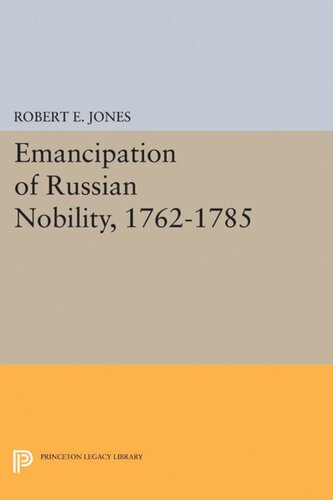

Most ebook files are in PDF format, so you can easily read them using various software such as Foxit Reader or directly on the Google Chrome browser.
Some ebook files are released by publishers in other formats such as .awz, .mobi, .epub, .fb2, etc. You may need to install specific software to read these formats on mobile/PC, such as Calibre.
Please read the tutorial at this link: https://ebookbell.com/faq
We offer FREE conversion to the popular formats you request; however, this may take some time. Therefore, right after payment, please email us, and we will try to provide the service as quickly as possible.
For some exceptional file formats or broken links (if any), please refrain from opening any disputes. Instead, email us first, and we will try to assist within a maximum of 6 hours.
EbookBell Team

0.0
0 reviewsCatherine the Great's treatment of the Russian nobility has usually been regarded as dictated by court politics or her personal predilections. Citing new archival sources, Robert Jones shows that her redefinition and reorganization of the Russian nobility were in fact motivated by reasons of state.
In 1762, Peter III had "emancipated" the nobility from obligatory state service, and in the early years of her reign Catherine attempted to govern Russia through a bureaucratic administration. Although this threatened the provincial nobles with social and economic decline, the government was oblivious to their plight until the peasant revolt of 1773-1775 convinced Catherine that she could not provide Russia with a government capable of defending and promoting the national interest without them. This realization led to the formation of a new alliance between the state and the nobility, based on a mutual fear of peasant revolt and expressed first in the provincial reforms of 1775 and finally in Catherine's Charter to the Nobility of 1785. In the 1760's Catherine had hoped to forestall peasant uprisings by improving the lot of the serfs and limiting the authority of the serf-owners. But faced with the choice between controlling the serfs in a way open to abuses and eliminating abuses in a way that might lead to loss of control, Catherine chose the former. Her Charter committed the state to the preservation of serfdom and the reactionary ancien régime.
Originally published in 1973.
The Princeton Legacy Library uses the latest print-on-demand technology to again make available previously out-of-print books from the distinguished backlist of Princeton University Press. These editions preserve the original texts of these important books while presenting them in durable paperback and hardcover editions. The goal of the Princeton Legacy Library is to vastly increase access to the rich scholarly heritage found in the thousands of books published by Princeton University Press since its founding in 1905.